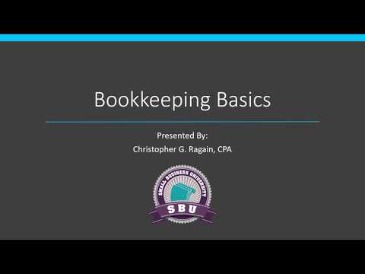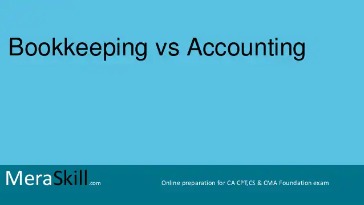
The main objective of bookkeeping is to keep all financial transactions recorded properly and systematically. Accounting’s objective is to gauge a company’s financial situation and to communicate that information with the relevant people. Bookkeepers must be accurate in their work and have knowledge about financial topics but bookkeepers are usually overseen by accountants.
The job of bookkeeper does not require any special skills or educational degree, though some hold an associate’s degree. Fanya Becker is a Synder expert with sound experience in consulting various clients on automation solutions. The exact pricing will depend on the amount of work needed doing, as well as whether you are hiring someone to work in-house or remotely.

The FASB’s standards are also adopted by many non-publicly traded companies to ensure consistency and transparency around accounting practices. Accounting and bookkeeping services can be essential in managing your business’s finances, regardless of the size of your company or the type of business you run.
Bookkeeper Vs Accountant: What Is The Difference?
If you are considering a future in accounting, you may be wondering which number-crunching career is right for you. Decision-makers often seek the advice of accountants when they need help with budget forecasting, calculating tax liabilities, and tax filing. When common people talk about bookkeepers, accountants, or CPAs , they cannot really make out the exact differences between them.
Is bookkeeping a stressful job?
Keeping the books for a business can actually be a very stressful job. Not only do you have to be a total perfectionist in making sure that no comma, decimal, or number is out of place, you also need to stay on top of every employee to make sure they give you the information you require.
The bookkeeper may use a cash flow software like Bill.com to manage all of a businesses vendor bills. The bookkeeper gets notified when the vendors email or fax their bills directly to the client’s Bill.com account, and then assign the proper vendor, expense category, and client as an approver. As technology has changed the way we all work, we have seen a shift in bookkeeping vs. accounting. Automations within accounting software have dramatically streamlined the bookkeeping function.
Having accurate records and an up-to-date awareness of how your business flows on a short-term basis is a key component for deciding where to go next, and that’s where a bookkeeper comes in. While a bookkeeper will remain an important partner for strengthening that foundation of a company, when it comes to creating pathways for the future, you should look to an accountant. A bookkeeper is the person on your team who handles your business’s books the most.
Certified Public Accountants must also pass a rigorous, four-part exam before becoming licensed in the field. Meanwhile, accounting assistants, payroll professionals, and bookkeepers need a foundational education in accounting in order to launch a career. Every company or individual needs to manage their books and take care of the finances. For this, you need to hire (on a full-time or freelancing basis) a bookkeeper — the main aim to maintain a systematic record of the transactions and balance the books.
Business Checking Accounts
Like any position, the responsibilities of a bookkeeper can vary depending on the business. Some bookkeepers will also handle accounting tasks, and others will also deal with employee services, like managing payroll for example. We’ll go into the job specifics a little later— but first let’s take a look at the functions of a business accountant. In general, an accountant’s role requires a higher level of expertise and education. Accountants use the records bookkeepers provide to assess big-picture finances and make smart business decisions. Accountants generally hold an accounting degree and are registered as a certified public accountant . CPAs must pass the CPA exam in order to use that title; this credential is highly valued in the accounting profession.
A bookkeeper with professional certification shows he or she is committed to the trade, possesses the skills and expertise required, and is willing to continue learning new methods and techniques. AIPB certification requires bookkeepers to have at least two years of full-time work experience and pass a national exam. To maintain the credential, bookkeepers are required to engage in continuing education. Each sale and purchase made by your business must be recorded in the ledger, and some items will need documentation. You can find more information on which transactions require supporting documents on the IRS website. Bookkeeping is a direct record of all purchases and sales that your business conducts, while accounting is a subjective look at what that data means for your business. Industries that work with complex financial systems and high-volume transactions require accountants, i.e. government agencies, colleges, hospitals, etc.
Ways Millennials Accidentally Ruin Their Finances
This fact makes your search for a bookkeeper quite hard to narrow down, but you can start by asking your colleagues for recommendations and browsing on websites like LinkedIn. A lot of U.S. bookkeepers get the American Institute of Professional Bookkeepers certification. It proves that the bookkeeper has signed the AIPB’s Code of Ethics and has successfully fulfilled its certification standards. A native Salesforce accounting platform, Accounting Seed, provides a full 360-degree view of your business’ performance to help you and your accounting team make the best decisions possible. Our platform can be customized to work with any system you have through a reliable connection.
These functions will slightly decrease in the future and may even become obsolete as most bookkeeping tasks will be handled by bookkeeping software. As technology continues to grow, the landscape of bookkeeping and accounting is shifting and we are starting to see the line between the two fields slowly disappear. A bookkeeper can help you manage your financial books by documenting transactions, managing accounts, and recording financial data. The difference between a CPA and a regular accountant is that only CPAs can write an audited financial statement, such as a balance sheet or income statement.

Whereas accounting involves interpreting, analyzing, classifying, and reporting financial data related to business transactions so as to interpret business conditions in a proper manner. The primary part of Accounting deals with Bookkeeping or recorded financial transactions, and the later part includes analyzing and reporting those financial data. So, what roles do bookkeepers and accountants play now if tasks are automated?
When You Need A Bookkeeper Vs Accountant Vs Controller Vs A Cfo
In the U.S. accountants have to have at least an undergraduate degree in accounting, or more rarely in finance. Bookkeeping is typically seen as a process that deals largely with financial transactions and general business administration. Accounting, on the other hand, is primarily about processing the information produced by bookkeepers and, based on it, generating business insights and providing financial forecasts. It’s pretty obvious that accounting software is better than bookkeeping software.
Do I need a bookkeeper or CPA?
Whether you hire an employee or a contractor, you will need a bookkeeper. That bookkeeper might work for an accountant or a CPA. You also must have someone to help you review your financial reports and help you make decisions on finances and taxes.
Let’s discuss the differences between the two regarding qualifications and salaries. Hal also points to OPS (other people’s skills) as a reason to get bookkeeping help sooner than later. The business owner is an expert in their business, and a good bookkeeper is an expert in processes and accounting. It’s worth the money to use OPS to do the things that you might not be good at or enjoy so that you can focus on what’s really important—your business.
Intuit Inc. does not warrant that the material contained herein will continue to be accurate nor that it is completely free of errors when published. As you grow, it’s important to invest in professionals who can keep your accounting system on track, free up your time, and help you make better decisions for your business.
There are educational requirements to sit for the CPA exam and continuing education requirements for accounting professionals that obtain the designation. Think of accountants like doctors—they look at symptoms and prescribe something so businesses can improve their financial health. Depending on your state, your business’ needs, and the candidate’s qualifications, salaries may vary. According to PayScale, the average salary for a bookkeeper is $41, 244 while for accountants the average is $50, 420. Because of their additional education and certifications, accountants typically make a higher salary than bookkeepers. The client creates their own estimates and invoices, then receives payments against those invoices.
Bookkeeper Vs Accountant Skills
However, if you’re like most small business owners, you’ve likely got enough on your plate. If you’re not prepared to take on these challenges with expert-level financial strategy and accuracy, you may want to consider hiring a professional. Most businesses will still need a bookkeeper to keep track of the books but it will become a lot more than just data entry, balancing bank ledgers, and bank reconciliation.
Such bookkeepers undertake assignments that will include generating financial reports and transaction classifying processes, a preserve for accountants. The company may also only require the services of just an accountant, especially where accounting software has memorized transactions and automated the reports. Such an accountant will have to make bookkeepers classifications and transaction recording processes to begin the accounting procedures.
- Careless mistakes that seem inconsequential at the time can lead to bigger, costlier, more time-consuming problems down the road.
- As a result, our clients receive 24/7 accounting and support, plus incredible insight into their financials with beautiful dashboards and unlimited reporting.
- Fifty states plus the District of Columbia require accountants to earn 150 credit hours of college education before taking the national four-part Uniform CPA exam.
- But if you work in a very tax specific area, you might think of hiring one as well.
- An experienced bookkeeper can offer advice on ways to create effective financial systems so nothing falls through the cracks on a daily basis.
Accounting processes may call for an accountant to correlate and indemnify the books or records presented by a bookkeeper. Simply put, bookkeepers are responsible for the recording of financial transactions whereas accountants are responsible for classifying, analyzing, interpreting, reporting, and summarizing this financial data. Students also gain first-hand experience with accounting systems, data transformation, SQL and other industry software that is vital to digital organizations’ long-term success. As an industry term, accounting refers to the process of financial statement preparation and analysis, an academic field of study, a profession and more.
Bookkeeper Vs Accountant: Which Is Right For You?
It’s helpful to understand the different roles of a bookkeeper and an accountant so you can utilize them appropriately as your business grows. Although they both have a hand in your company’s finances, their skill sets and purposes vary. Financial decisions cannot be made exclusively based on bookkeeping records but can be considered based on accountant records.
It’s not cost-effective to hire an expensive accountant to handle what a bookkeeper can comfortably do at a much less price. It is important to understand whether you need to hire a bookkeeper or an accountant. This bookkeeping choice is primarily dependent on the industry and the level of expertise required. A bookkeeper records and classifies a company’s daily financial transactions such as sales, payroll, payment of bills, etc.